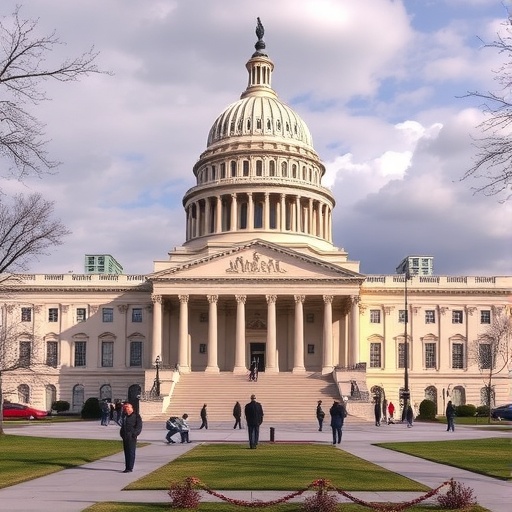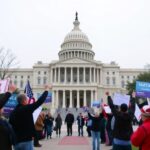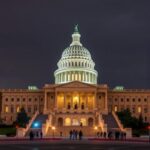Senate Deadlock Prolongs Government Shutdown: Democrats Block Republican Funding Extension to November 21
In a tense late-night session on Capitol Hill, the U.S. Senate plunged deeper into partisan gridlock as Democrats decisively blocked a Republican-led proposal to extend government funding through November 21, extending the ongoing shutdown and leaving millions of federal workers in limbo. The vote, which failed 48-52, highlighted the stark divisions over spending priorities and immigration policy, raising alarms about the potential for prolonged economic disruption just weeks before the holidays.
- Democrats’ Firm Stand: Rejecting the GOP’s Short-Term Patch
- Federal Workers Bear the Brunt: Stories from the Shutdown Frontlines
- Partisan Fault Lines: Immigration and Spending at the Core of the Standoff
- Republican Pushback: Crafting Counteroffers Amid Rising Tensions
- Path Forward: Negotiations Heat Up as Economic Clock Ticks
The shutdown, now in its fourth day, stems from a lapse in federal appropriations after Congress failed to pass a stopgap funding measure before the midnight deadline last Friday. With non-essential government operations halted, landmarks like the Smithsonian museums remain closed, national parks are operating on skeleton crews, and over 800,000 federal employees face delayed paychecks. Senate Majority Leader Chuck Schumer (D-NY) accused Republicans of using the funding bill as a Trojan horse for unrelated political demands, while Senate Minority Leader Mitch McConnell (R-KY) decried the Democratic stance as “irresponsible brinkmanship.”
This latest impasse underscores the high stakes in Washington, where funding negotiations have become a battleground for broader ideological fights. As the Senate reconvenes, the question looms: how long can this shutdown last before real damage sets in?
Democrats’ Firm Stand: Rejecting the GOP’s Short-Term Patch
At the heart of the shutdown drama was a Republican-sponsored continuing resolution (CR) aimed at averting immediate crisis by maintaining current funding levels until November 21. Proponents, led by Sen. Lindsey Graham (R-SC), argued it would buy time for comprehensive budget talks without immediate pain to constituents. “This isn’t about politics; it’s about keeping the lights on,” Graham said in a floor speech, emphasizing that the bill avoided new spending increases.
But Democrats, unified in opposition, viewed the proposal as a delay tactic that ignored pressing needs like disaster relief for hurricane-hit regions and increased border security funding without corresponding immigration reforms. Senate Appropriations Committee Chair Patty Murray (D-WA) led the charge, stating, “We can’t keep kicking the can down the road while families suffer from underfunded services. This bill does nothing to address the real crises facing our nation.” The bloc vote revealed deep Democrats‘ skepticism, with only two Republicans joining them in opposition, citing concerns over hidden provisions that could tie future aid to conservative priorities.
Behind the scenes, negotiations had been fraught. Sources close to the talks revealed that initial bipartisan drafts included $10 billion in emergency aid for Ukraine and Israel, but Republicans pushed for offsets through cuts to green energy programs, a non-starter for Democrats. The failure to bridge this gap not only extended the shutdown but also eroded trust in the Senate‘s ability to function amid election-year pressures.
Federal Workers Bear the Brunt: Stories from the Shutdown Frontlines
As the government shutdown stretches on, the human cost is becoming starkly apparent. Federal employees from coast to coast are grappling with furloughs and financial uncertainty, a scenario all too familiar from the 35-day shutdown in 2018-2019, which cost the economy an estimated $11 billion according to the Congressional Budget Office (CBO).
Take Air Traffic Controller Marcus Hale from Atlanta’s Hartsfield-Jackson Airport, one of the world’s busiest. On furlough without pay, Hale told reporters, “I’ve got bills piling up, and my kids don’t understand why Santa might be late this year. This isn’t just numbers—it’s lives on hold.” Similar sentiments echo across agencies: IRS workers delaying tax processing, USDA inspectors halting food safety checks, and EPA scientists sidelined from environmental monitoring.
Statistics paint a grim picture. The Office of Personnel Management reports that approximately 2.3 million federal workers could be affected, with 800,000 furloughed outright. Small businesses near federal installations are also reeling; a National Federation of Independent Business survey found 40% of owners near military bases reporting revenue drops of up to 30%. In Washington, D.C., alone, the local economy loses about $100 million daily during shutdowns, per the District’s government estimates.
- Key Affected Agencies: Department of Defense (partial operations), National Park Service (visitor services limited), and Social Security Administration (benefit payments continue but new claims stall).
- Economic Ripple Effects: Moody’s Analytics predicts a 0.1% GDP hit for every week of shutdown, potentially compounding inflation pressures.
Democrats have seized on these impacts to rally public support, with Sen. Elizabeth Warren (D-MA) tweeting, “Republicans are playing games while workers pay the price. Time to end this charade.” Yet, some Republicans counter that Democrats’ insistence on broader reforms is prolonging the pain unnecessarily.
Partisan Fault Lines: Immigration and Spending at the Core of the Standoff
The Senate shutdown isn’t occurring in a vacuum; it’s the latest flashpoint in a years-long tug-of-war over funding priorities. At issue are deep-seated disagreements on immigration enforcement and domestic spending. Republicans, emboldened by border security concerns, demanded that any funding bill include $20 billion for wall construction and additional ICE agents—a demand Democrats labeled as electioneering ahead of November’s midterms.
Sen. Ted Cruz (R-TX), a vocal shutdown skeptic in past debates but now supportive of his party’s line, argued on the floor, “Democrats want open borders on the taxpayer’s dime. We’re drawing a line here to protect American communities.” In contrast, Democrats point to a bipartisan border bill that failed earlier this year, which included $4.3 billion for security without the wall funding Republicans now insist upon.
Historical precedents abound. The 2013 shutdown, lasting 16 days, was triggered by similar immigration disputes over Obamacare funding. Today, with national debt exceeding $35 trillion, both sides accuse the other of fiscal irresponsibility. The CBO warns that unresolved funding could lead to a debt ceiling crisis by year’s end, potentially spiking interest rates and unsettling markets.
- Past Shutdowns: 2018-2019 (35 days, longest ever); 1995-1996 (two periods totaling 26 days).
- Current Demands: Democrats seek $50 billion in housing and child care aid; Republicans prioritize defense boosts to $886 billion.
- Bipartisan Efforts: A small group of moderate senators, including Susan Collins (R-ME) and Joe Manchin (D-WV), proposed a clean CR but couldn’t muster enough votes.
Analysts from the Bipartisan Policy Center note that while short shutdowns are disruptive, prolonged ones risk eroding public faith in institutions, with approval ratings for Congress hovering at historic lows of 18% per Gallup polls.
Republican Pushback: Crafting Counteroffers Amid Rising Tensions
In response to the Democratic blockade, Republicans in the Senate are regrouping with alternative strategies to break the shutdown impasse. House Speaker Mike Johnson (R-LA), coordinating with Senate allies, announced plans for a revised funding package that strips out immigration riders and focuses solely on core operations through December 15. “We’re willing to compromise, but not at the expense of our principles,” Johnson said in a press conference, flanked by GOP leaders.
Within the Senate, factions are emerging. Fiscal hawks like Sen. Rand Paul (R-KY) advocate for deeper spending cuts, estimating that the current shutdown could save $2 billion daily in non-essential outlays. However, defense-minded Republicans, wary of military readiness impacts, urge swift resolution. A leaked memo from McConnell’s office suggests private talks with Schumer could resume as early as tomorrow, potentially incorporating disaster aid for Hurricanes Helene and Milton victims—$50 billion in requests pending.
Public pressure is mounting too. Veteran groups, including the American Legion, have lobbied intensely, warning that delayed VA benefits could affect 9 million enrollees. Economists from the Brookings Institution project that if the shutdown exceeds two weeks, unemployment could tick up by 0.2%, hitting blue-collar sectors hardest.
Quotes from the GOP side underscore frustration: “This is Democrats’ shutdown,” Sen. John Thune (R-SD) told CNN, blaming the opposition for refusing a “clean” bill. Yet, internal divisions persist, with some Republicans fearing voter backlash in swing states like Pennsylvania and Wisconsin, where federal jobs are plentiful.
Path Forward: Negotiations Heat Up as Economic Clock Ticks
With the Senate shutdown showing no signs of immediate resolution, eyes are on upcoming procedural votes and White House interventions. President Biden, in a Rose Garden address, urged Congress to “put people over politics,” hinting at possible executive actions to mitigate impacts, such as advancing pay for essential workers via emergency funds.
Experts foresee a narrow window for deal-making. The funding deadline’s extension to November 21 in the failed bill was meant to align with post-election lame-duck sessions, but now uncertainty reigns. Bipartisan negotiators are floating a hybrid approach: a one-month CR with $15 billion in targeted aid for agriculture and small businesses, sidestepping hot-button issues.
Longer-term, the episode exposes fractures in the Democrats and Republicans‘ ability to govern. The Pew Research Center reports that 72% of Americans view the shutdown as harmful, with independents particularly disillusioned. If talks stall further, analysts warn of cascading effects: delayed farm subsidies amid harvest season, stalled infrastructure projects under the Bipartisan Infrastructure Law, and heightened market volatility as investors eye fiscal cliffs.
Yet, glimmers of hope persist. Informal caucuses between Senate moderates could yield progress by week’s end, potentially averting deeper economic scars. As one Capitol Hill staffer put it anonymously, “Everyone’s tired of this circus—expect movement soon, but not without more drama.” The nation watches, bracing for the next twist in this high-stakes funding saga.








